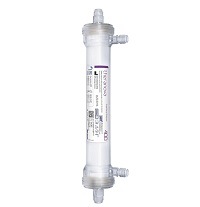
Baxter International, a global innovator in renal care, has announced new data showing expanded haemodialysis (HDx) therapy enabled by the company’s Theranova dialyser may reduce cardiovascular events by 35% and hospitalisation rates by 18%. This data comes from a new, large, multicentre retrospective study of Colombian dialysis patients treated with long-term HDx compared to propensity-matched patients treated with high-flux haemodialysis, and was presented at the 58th European Renal Association-European Dialysis and Transplant Association Congress (ERA-EDTA, 5–8 June 2021, virtual).
“Innovation is fueled by continued scientific study and exchange through meetings like the 58th ERA-EDTA,” said Peter Rutherford, senior medical director, Baxter Renal Care business. “These new findings support a growing library of evidence that kidney disease patients on HDx therapy enabled by Theranova may experience improved clinical outcomes and lower healthcare resource utilisation.”
Theranova was designed to deliver HDx therapy, which filters a wider range of molecules from the blood than traditional haemodialysis filters by targeting effective removal of conventional (500Da to 25kDa) and large middle molecules (25kDa to 45kDa)—allowing for filtration closer to that of the natural kidney, according to a Baxter press release. These large middle molecules may be associated with inflammation and cardiovascular disease in patients with kidney failure.
New data from the observational, multicentre, retrospective cohort analysis, entitled “Effectiveness of medium cut-off versus high flux dialyzers: An inverse probability weighting cohort study”, was unveiled through an oral presentation at the 58th ERA-EDTA Congress. The study involved more than 1,000 adult prevalent haemodialysis patients followed for up to two years at Baxter Renal Care Services clinics in Colombia.
Weighted incidence rate ratios (IRRs), and rates and duration of hospitalisation and cardiovascular events according to dialyser type, were obtained using binomial negative regression with the weighting sample. Hospitalisation rates and hospitalisation days were recorded over two years. While lower hospitalisation rates and cardiovascular events were found in association with HDx therapy enabled by Theranova, no differences in hospitalisation duration or survival were identified. In the release, Baxter added that randomised clinical trials are needed to confirm the observed effect.












